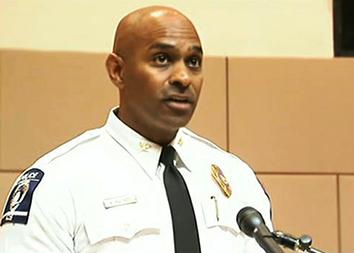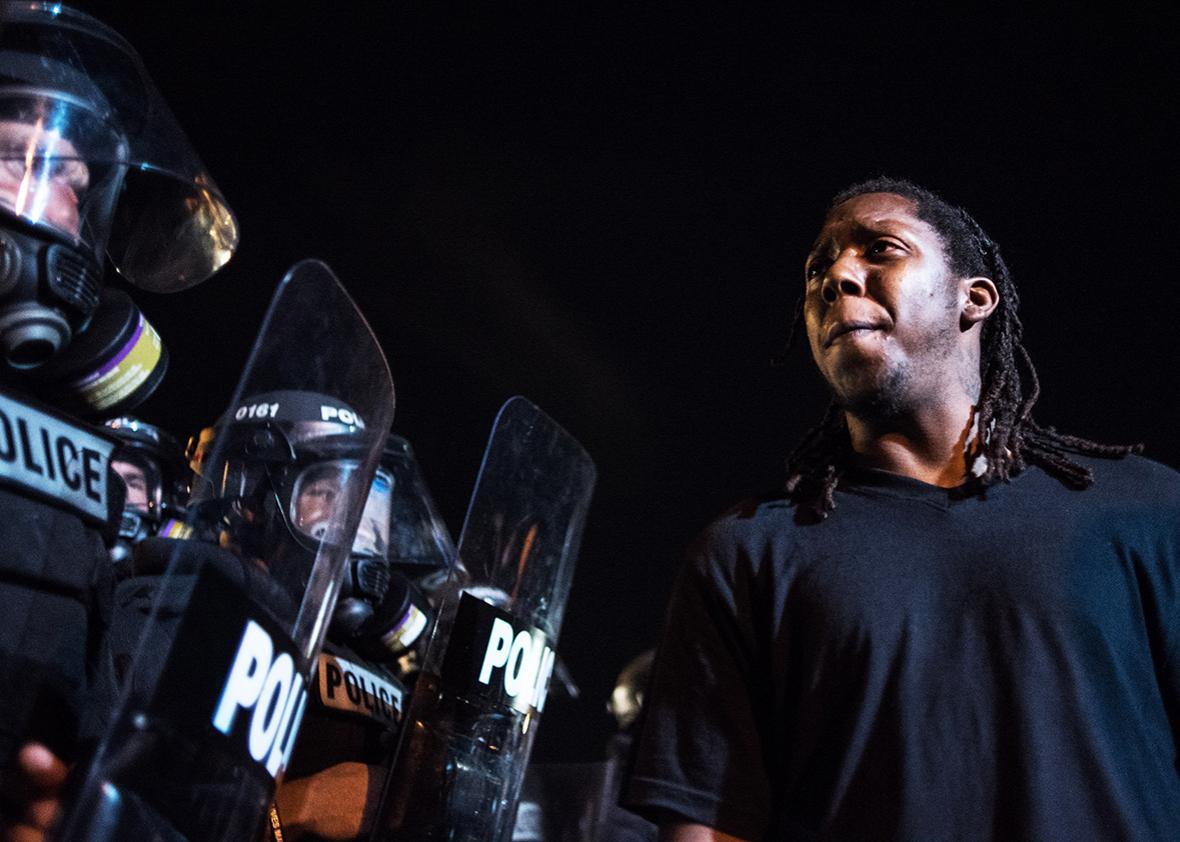It was August 2015, and the Charlotte-Mecklenburg, North Carolina, police chief was talking about the distinction between police shootings that are “legally justified” and “morally right.”
“ ‘Legally justified’ doesn’t mean we don’t try to meet higher standards of what’s ethically and morally right and wrong,” Kerr Putney told me in an interview at Charlotte-Mecklenburg Police Department headquarters. “Sometimes the legal standard is the lowest standard. It’s what we’re here to enforce and achieve. But we always are reaching higher.”
At the time of our conversation, residents of Charlotte were still processing the trial of Randall Kerrick, a local officer charged with voluntary manslaughter for shooting a black college football player named Jonathan Ferrell. In many ways, the Kerrick case, which ended in a mistrial a few weeks before my meeting with Putney, was the backdrop for the protests that erupted in Charlotte on Tuesday night over the fatal shooting by a police officer of 43-year-old Keith Lamont Scott.
Putney, a longtime Charlotte cop, had been chief for about a month when we spoke, but already he had thought deeply about the use of deadly force by police, and he had arrived at conclusions that were both nuanced and informed by empathy.

WSOC-TV
Lethal force, he said, should only be used by police in absolute emergencies and cannot be justified—morally, legally, or otherwise—in situations where an officer is not in truly imminent danger.
“Some officers are gonna think, ‘If my life is in danger, I can use lethal force.’ But the law does not quite say it that way,” he said. “It has to be an imminent threat—and ‘imminent threat’ does not mean you’re anticipating what might happen. It has to be happening now, as in, ‘It’s about to go down, so I must react.’ The way we teach our people, you have to truly be in a position to lose your life—not, you’re afraid it could happen.”
I thought of Putney’s careful definition of imminent threat Wednesday morning, as his department defended its actions in the killing of Scott. Police say Scott was armed—his family members dispute this—and presented an “imminent deadly threat to officers.” Putney himself said Scott ignored several orders to drop his gun before the shooting occurred.
It was also hard not to think about the aftermath of Ferrell’s death in 2013, which played out in a very unusual way, thanks mainly to a man named Rodney Monroe, Kerr’s predecessor at the top of the CMPD. Monroe reckoned that Ferrell did not constitute an imminent deadly threat. This alone set that case apart from the vast majority of police shootings, which tend not to result in any criminal charges.
Ferrell had run toward Kerrick in the dark and ignored his commands to get on the ground. During the trial, Kerrick testified that he decided to shoot because he believed Ferrell was an armed burglar trying to kill him. But Monroe believed dashcam footage of the incident made clear that it was unreasonable for Kerrick to think Ferrell was armed or to perceive him as a threat to his life. As Monroe saw it, the footage showed that Ferrell had nothing in his hands as he began running toward Kerrick. That being the case, Monroe told me, Kerrick should have just used his fists if he thought Ferrell was attacking him.
Monroe retired a few weeks before the trial. Putney, who supported the decision to arrest Kerrick, told me that fear played a critical role in determining how these kinds of confrontations unfold. In ambiguous, fast-moving situations like the Ferrell case, Putney said, “You have this natural distrust that has accumulated, and it’s all brought to bear at that critical instant. … You layer on what’s going on nationally, and everything else, and people start expecting something volatile to happen.”
The Kerrick mistrial sparked hostile protests in Charlotte—home to one of the largest populations of middle-class blacks in the country—not unlike the ones that occurred Tuesday night. But ultimately, I left Charlotte believing that the open airing of evidence in a public courtroom had provided some measure of relief to the community, even though it had obviously been stressful for Kerrick and his family.
No one knows yet how the death of Keith Lamont Scott will end up reverberating in the city and beyond, especially since the circumstances of his shooting defy easy analysis. Does it matter that the officer who killed him was black? Does it matter if he was or wasn’t carrying a gun, given that North Carolina is an open-carry state? Was the killing of Scott morally justified? These aren’t straightforward questions. In Putney, Charlotte has a police chief who has the capacity to approach them with uncommon sensitivity. Let’s hope he uses it.
